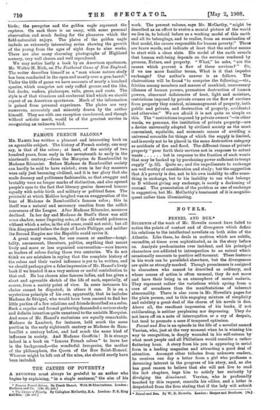FAMOUS FRENCH SALONS.*
Mn. HAMEL has written a pleasant and interesting book on an agreeable subject. The history of French society, one may say, is that of the salons ; at least, of the society of two hundred years, from early in the seventeenth to early in the nineteenth century,—from the Marquise de Rambouillet to Madame Recamier. Before Madame de Rambouillet society can hardly be said to have existed ; even in her day manners were only just becoming civilised, and it is her glory that she made decency and politeness fashionable, so that swagger and brutality were no longer marks of distinction, and also opened people's eyes to the fact that literary genius deserved honour equally with noble birth and military or political fame. The preciosite at which Molrere laughed was an exaggeration of the tone of Madame de Rambouillet's famous salon; this in itself was a natural and necessary reaction from the selfish coarseness of the League. After Madame Recamier, manners declined. In her day and Madame de Steers there was still some shadow, some lingering echo, of the old-vvorld politeness "without which a salon, in the old sense, could not exist; but all this disappeared before the days of Louis Philippe, and neither the Second Empire nor the Republic could revive it.
A great many women, for one reason or another—hospi- tality, amusement, literature, politics, anything that meant lively and more or less organised conversation—were known as leaders of salons during those two centuries. We do not think we are mistaken in saying that the complete history of the salons and their varied influence is yet to be written, and we shouldperhaps give a false impression of Mr. Hamel's lively book if we treated it as a very serious or useful contribution to that end. He has chosen nine famous ladies, and has given a short and agreeable sketch of the life of each, especially, of course, from a society point of view. In some instances his choice cannot be disputed; hi others it can. It is on a mysterious principle of his own, apparently, that he includes Madame de Sevigne, who would have been amused to find her little parties of a few relations and friends described as a salon. Such a regular and formal gathering demanded a serious study 'and definite intention quite unnatural to the amiable Marquise. And some of Mr. Hamers exclusions are equally remarkable. Madame de Lambert, for instance, held much the same position in the early eighteenth eentury as Madame de Ram- bouillet a century before, and had much the same kind of influence in society. And Madame Geoffrin ! It is strange indeed in a book on " famous French salons" to leave her in the background,—the wonderful bourgeoise, the mother of the philosophers, the Queen of the Rue Saint-Honore. Whoever might be left out of the nine, she should surely have been included.








































 Previous page
Previous page